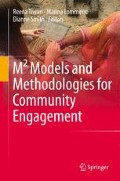Abstract
This chapter proposes a model for offering pro-bono architectural design projects to communities in a fashion that facilitates capacity-building opportunities for three cohorts: academic researchers, early-career graduates and industry professionals. The model provides a structure for collaborative work between all three participants, one that enables developing community-based pro-bono design projects that address real community needs. The model is first described in general terms, then illustrated by a case study comprising a pro-bono residential design project, then discussed in terms of the implications of the case study.
The community-focused project that forms the case study was designed by an academic researcher, developed by a recent architecture graduate and supported by practice professionals who provided mentoring, technical back-up and professional indemnity support. In addition to these pro-bono contributions from all participants, the project was supported by a small $ 3,000 publishing grant that enabled the academic to hire the graduate as a research assistant. At the conclusion of the project, each participant in this transient pro-bono community found they gained considerably from the experience. The recently graduated practitioner gained strong client/community experience. The architectural practice gained a more experienced employee and made a contribution to community. The academic found a way to connect academic capacities with community while developing new understandings of the productive nexus between creative practice and academic research. Moreover, and not least, there was a gain for the client, who became a fourth participant in the capacity-development effect of the project.
Access this chapter
Tax calculation will be finalised at checkout
Purchases are for personal use only
References
Bachelard, G. (1969). The poetics of space (trans: M. Jolas). Boston: Beacon Press.
De Bono, E. (2000). New thinking for the new millennium. Beverly Hills: New Millennium Press.
De Bono, E. (2008). Six thinking hats. Camberwell: Penguin.
Marshall, C. (2010). A research design for studio-based research in art. Teaching Artist Journal, 8(2), 77–87.
McGann, S. (2009). Switching hats: From accessibility to possibility. Australasian Medical Journal, 1(13), 162–166. doi:10.4066/AMJ.2009.134.
Milech, B., & Schilo, A. (2004). “Exit Jesus”: Relating the exegesis and creative/production components of a research thesis. TEXT, (3), 1–13.
Till, J. (2009). Architecture depends. Cambridge: MIT Press.
Author information
Authors and Affiliations
Corresponding author
Editor information
Editors and Affiliations
Rights and permissions
Copyright information
© 2014 Springer Science+Business Media Singapore
About this chapter
Cite this chapter
McGann, S., Milech, B. (2014). Connections: Academics, Architects and Community Pro-Bono Projects. In: Tiwari, R., Lommerse, M., Smith, D. (eds) M² Models and Methodologies for Community Engagement. Springer, Singapore. https://doi.org/10.1007/978-981-4585-11-8_8
Download citation
DOI: https://doi.org/10.1007/978-981-4585-11-8_8
Published:
Publisher Name: Springer, Singapore
Print ISBN: 978-981-4585-10-1
Online ISBN: 978-981-4585-11-8
eBook Packages: Humanities, Social Sciences and LawSocial Sciences (R0)

